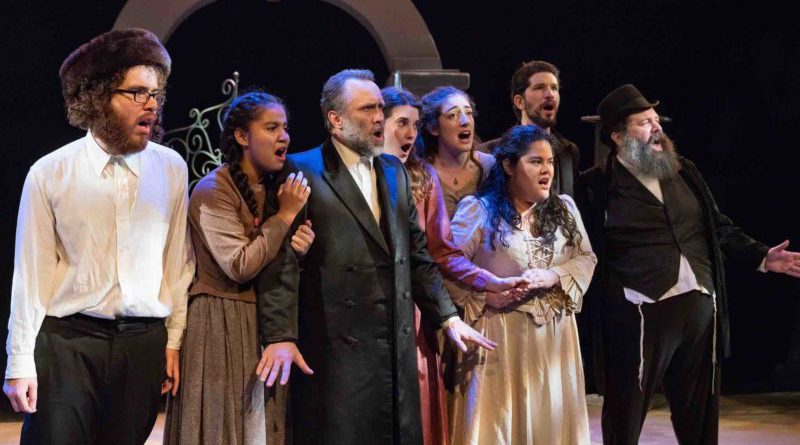INTERVIEW: From ‘The Manor’ to ‘The Open Gate’
Photo: The cast of The Open Gate, David Willinger’s musical adaptation of Nobel Prize Winner Isaac Bashevis Singer’s novel The Manor, now playing at Theater for the New City through Oct. 27. Photo courtesy of Steven Pisano / Provided by Glenna Freedman PR with permission.
The accomplished author Isaac Bashevis Singer, winner of the Nobel Prize for literature, has a lot of notable works across several genres that attracted readers throughout the 20th century. The late writer penned the novel The Manor, which has now been adapted into a new musical Written and directed by David Willinger, The Open Gate runs through Oct. 27 at Theater for the New City on the Lower East Side of Manhattan.
In the show, which features music by Arthur Abrams, a Jewish family in 19th-century Poland finds conflict with the social and scientific changes of their time. The modern era clashes with the traditions of religion and society, and this family find themselves in the middle of the struggle.
Willinger is an accomplished writer, having adapted Thomas Hardy’s Casterbridge into a musical. He has also shepherded along new stage versions of Jospeh Conrad’s Secret Agent, Albert Camus’ The Stranger and Carson McCullers’ Heart Is a Lonely Hunter, among others.
Willinger recently exchanged emails with Hollywood Soapbox about the new show. Questions and answers have been slightly edited for style.
What inspired you to adapt this story into a musical?
It was my surprise encounter with Isaac Bashevis Singer’s big novels. He’s better known for his short stories. He used to live in my neighborhood and was known for walking down Broadway and engaging in conversation with strangers. I was uninterested, assuming he was a primitive folklorist like Sholem Aleichem. After he died, I started reading his books. What a revelation. To me they were on a par with Thomas Mann or Céline or any of the great ‘big book’ stylists of the 20th century. And he was writing about my family’s heritage — both in the old country and here in New York City. He captured a vision of Judaism and Jewishness that I could recognize. …
The Manor seemed like a totally obvious basis for a musical or opera. It’s passionate, varied in tone, full of colorful characters and situations, and takes on really big issues, which still confront us today.
How have rehearsals been going?
I have an amazing cast — highly dedicated and creative. It’s been a total pleasure. In very short order we’ve established a productive ensemble feeling, in which I feel that the performers are incarnating my vision entirely. It’s been exciting too to recreate the rhythm of the novel — with its far-ranging sense of place and time — through figuring out a free-flow of transitions. Here Arthur Abrams’ music has helped a lot, but also the beautiful open set by Mark Marcante and Lytza Colon, as well as Alex Bartenieff’s versatile lights.
How much research, beyond the original novel, did you have to conduct?
There has been a good deal of research about the customs of observant Jews in 19th-century Poland. For example, one must ask, what level of modesty was kept in dress codes? Was décolletage permitted? Could a woman show her lower arms? Might a man appear in shirt-sleeves? How would an ordinary person greet a Rabbi? What kinds of contacts were entertained between Jews and Gentiles? We can observe Hassidim in Brooklyn of today, but are they really identical to their forebears over a century ago? It’s been interesting. Also, we’ve added in elements of the Jewish service — certain melodies and chants. And that’s really enriched the show. I’ve had to ask myself whether I was profaning it in doing so, but we have a consensus in the cast that it’s not so.
What’s it like working with composer Arthur Abrams and choreographer Michael Vazquez?
I have long-standing creative relationships with both of them. This show in many ways is Arthur’s and my magnum opus — a culmination of our decades-long process. …
Creating a score such as this is incredibly energy-intensive, because Arthur has also arranged the music for five instruments — a classic klezmer ensemble. We have the kind of relationship where I can tell him to change the music in this way or that, and he can offer suggestions for improving the lyrics. Neither of us gets too defensive, and such interventions usually lead to improvements.
Michael Vazquez is an unknown genius. His choreography is so dynamic and integrated into the dramatic situation. He discovers what the actors’ physical potentials are and pushes them to their limits. He has very high standards for work ethic and makes great demands. He is one of the theatre artists I know for whom I have the highest admiration and consider myself blessed to be working with him. To be honest, I hesitated to ask a Puerto Rican to stage Jewish dances, but then I thought: He’s so rigorous; he’ll find out how to do it! And he has! …
What do you hope the audience takes away from the show?
Something about the humanity of Jews, the multiplicity of who can be a Jew, the notion that Jews engage with mysticism and skepticism just as all peoples do in their own way. That Jewish mysticism — as depicted in Singer’s novel (to me, so beautifully, as incarnated in the character of the saintly young Rabbi Jochanon) resembles Christianity, Buddhism, Sufism and all mystical traditions. That investing one’s faith in material accumulation is not a pathway to happiness, and one is eventually confronted by oneself. I’d just like the audience to be moved to laughter and tears and enjoy the musical numbers as well. And the amazing performances.
By John Soltes / Publisher / John@HollywoodSoapbox.com
The Open Gate is currently running at Theater for the New City on the Lower East Side of Manhattan. Click here for more information and tickets.

